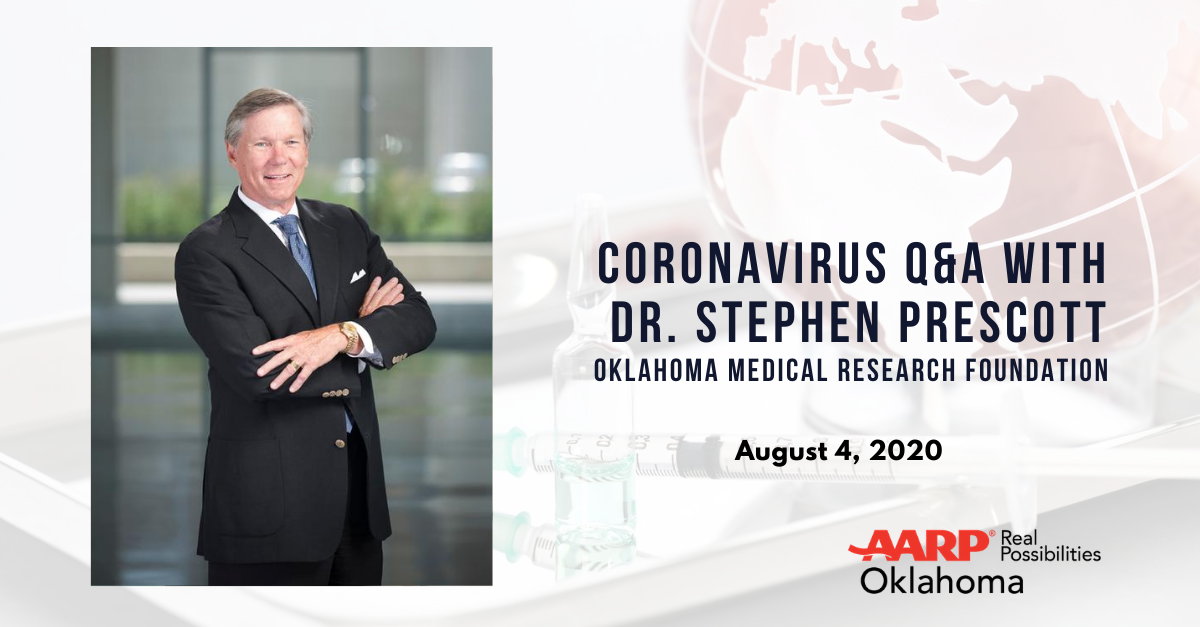Coronavirus Q&A with Dr. Stephen Prescott: August 4 Update

Dr. Stephen Prescott, Oklahoma Medical Research Foundation president, answers your medical questions about coronavirus and COVID-19.
Can COVID-19 be transmitted indoors by aerosol particles?
Yes. When you’re inside around other people, you are inevitably sharing a lot of air, and a lot of places don’t have rapid turnover of air in the room. We know for sure that droplets can linger in the air, with air conditioning recirculating them and spreading them around a room. That gives anyone in the path of that air the chance to breathe in the infected particles, until they eventually drop to a surface, get caught in an air filter, or are sent outside via air exchange. The best solution is to avoid crowded indoor spaces. And if you find yourself indoors with people who aren’t in your “bubble,” practice physical distancing, wear your mask, and open a window if you can.
If I was previously infected with COVID-19, can I get it again?
We aren’t yet certain. There are a growing number of accounts of reinfections, but we aren’t sure if these people are being reinfected or are simply still carrying the virus. To date, researchers have not been able to document any cases of reinfection. Case reports, mostly from China, indicate that some people, particularly older ones, take an extremely long time to clear the virus. That means they can be sick, seem to recover, but still carry the virus. This is the most likely explanation for the accounts of reinfection, and it would fit with what we see in other viruses, where an initial infection triggers at least short-term immunity. But, like so much with this virus, we’re still learning the answers.
After 3 months post-COVID-19, are the antibodies reduced in the antibody testing?
This really varies on a person-by-person basis, and researchers at OMRF and elsewhere are trying to answer this question. In fact, we are currently looking for volunteers for COVID-19 antibody testing, especially people with high-risk conditions (heart disease, diabetes, obesity and high blood pressure), those with Native American heritage, and those who know or suspect they have recovered from the virus. If you’re interested in participating, please call 405-271-7221.
What does the COVID-19 pandemic mean for privacy related to my medical data?
The pandemic shouldn’t have any impact on the privacy of your medical data. Like all testing for infectious diseases, the results of COVID-19 tests are reported to the health department. So, the health department will get that information, and someone may contact you. But any information related to your test, even a positive result, stays confidential, as the health department operates by the same privacy rules as your doctor.
I'm still hearing mixed signals about hydroxychloroquine?
Allow me to simplify: hydroxychloroquine doesn’t work on COVID-19. It will not help with prevention or treatment, but the new demand could make it hard for the people who actually need it: autoimmune disease patients. And that simply should not happen.
Are there mutations and is that reducing the severity of COVID-19?
It absolutely does develop mutations: that’s how COVID-19 came to exist from other coronaviruses. But it is mutating slowly compared to other viruses, especially something like influenza. There’s also no evidence the mutations that have occurred in COVID-19 have decreased the severity. The apparent drop in death rates can be attributed to two things. First, medical professionals have a better grasp on what they’re dealing with and how to care for infected patients. Second, the demographics of infection have shifted from the elderly toward more young people. This may make the virus seem less serious. But trust me, if you’re in our age group, you want no part of it.
What type of mask do you recommend? I’m not sure about the different materials and what is the best. I see some that are “antimicrobial,” others are cotton, some are a poly-blend. Are the disposable masks acceptable to use?
The type of mask is less important than wearing one. Both disposable and washable masks are fine, cotton or poly-blend, You can even reuse a disposable one. I wear a surgical mask, mostly because I’m used to it after a long medical career and find it comfortable. The only masks I’d avoid are ones with a valve to "breathe easier." That defeats the purpose, as the valve reduces the filter that stops viral particles.
Related articles:
Coronavirus Q&A with Dr. Stephen Prescott: July 24 Update
Coronavirus Q&A with Dr. Stephen Prescott: April 28 Update
Coronavirus Q&A with Dr. Stephen Prescott: April 9 Update
Coronavirus Q&A with Dr. Stephen Prescott: April 2 Update
Coronavirus Q&A with Dr. Stephen Prescott: March 26 Update
AARP and coronavirus
AARP has been working to promote the health and well-being of older Americans for more than 60 years. In the face of this pandemic, AARP is providing information and resources to help older people and those caring for them protect themselves from the virus and prevent it spreading to others. AARP is compiling facts and resources about coronavirus and how you can protect yourself. We’re updating this information as rapidly as we can to ensure our AARP members have the information they need at www.aarp.org/coronavirus.


